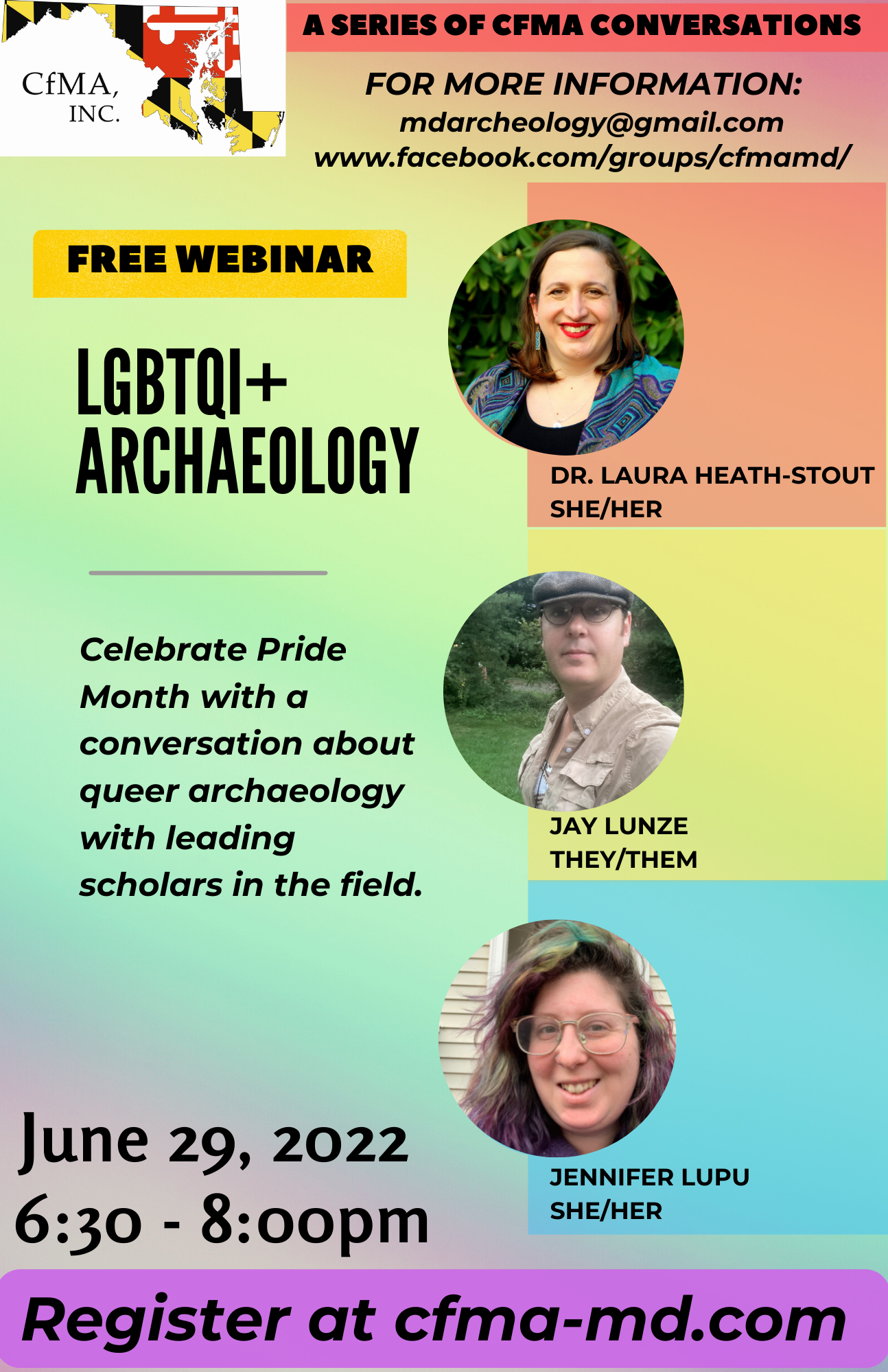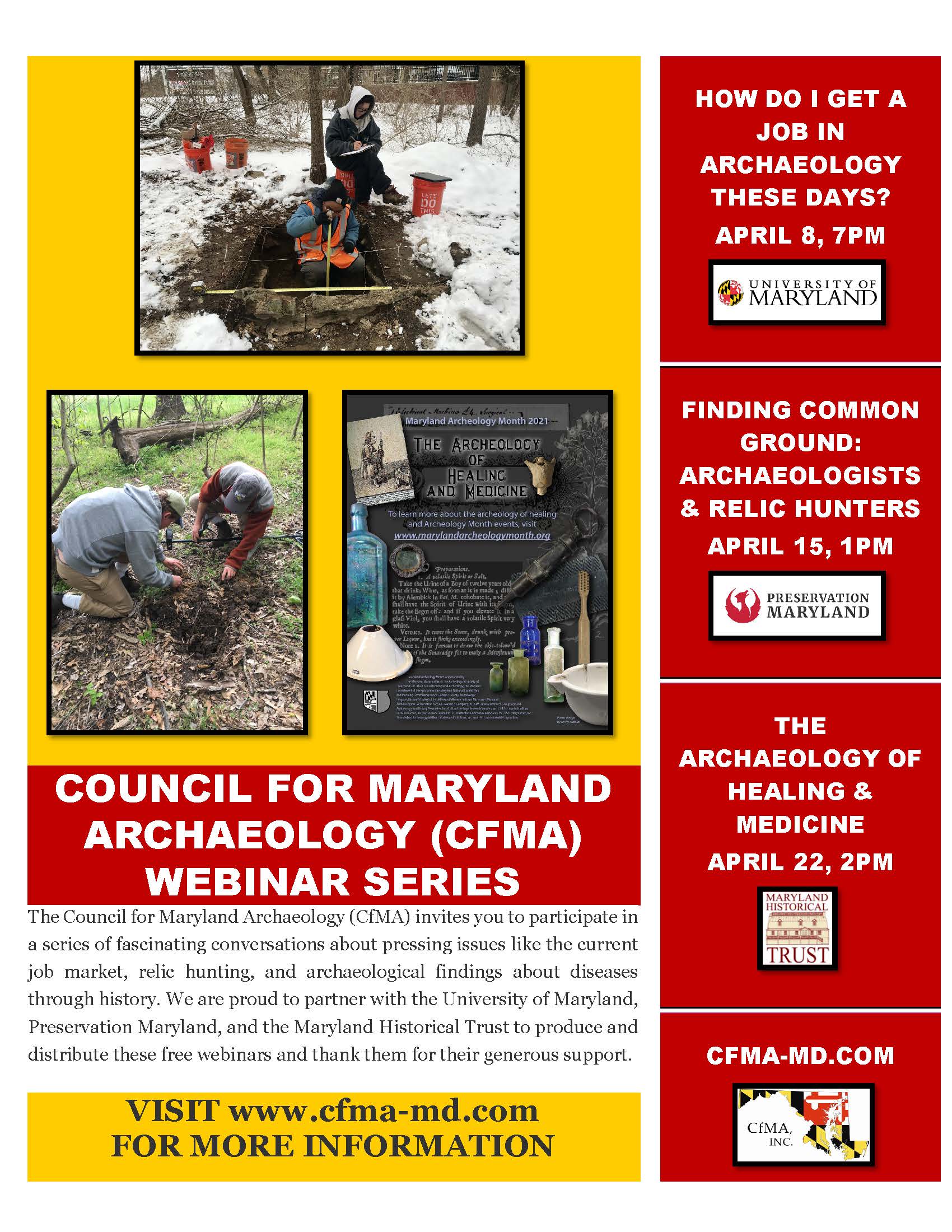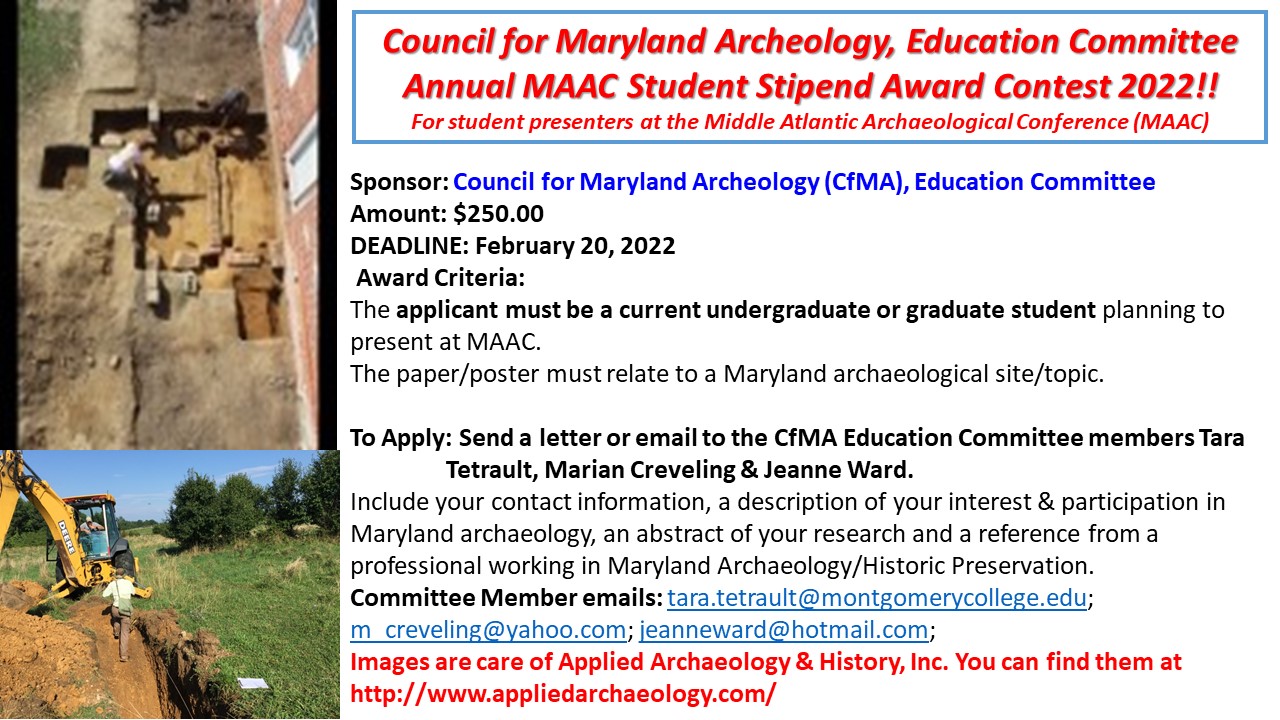- Details
The Council for Maryland Archeology (CfMA) is launching a year of free webinars called “CfMA Conversations” beginning this month. Join us on April 26, 2022 from 6:00-7:30pm for the first installment, called “Accessible Archaeology at Barwick’s Ordinary” to learn about digital technologies, research sharing, and public education at the site of the upcoming Archeological Society of Maryland (ASM) Field Session. Participants will be treated to a conversation with Washington College professor Dr. Julie Markin and two of her students about their work to locate buried structures and innovative techniques to share these discoveries with people around the world. Click HERE for more info or to register.
- Details
In April 2022, The Council for Maryland Archeology (CfMA) launched a year of free webinars called “CfMA Conversations” with a presentation on "Accessible Archaeologt at Barwick's Ordinary". Join us during Pride Month, for the second installment in our series on June 29, 2022, from 6:30-8:00 PM with a panel of experts exploring queer archaeology. Don’t miss this fascinating discussion about the personal triumphs and struggles of LGBTQI+ professionals currently working in the field, intriguing discoveries made when examining archaeological sites with a more inclusive lens, and collaborations developed to promote queer heritage. Panelists include Laura Heath-Stout (she/her), Jay Lunze (they/them, she/her), and Jennifer Lupu (she/her) and the moderator will be Sarah Janesko (she/her).
To register for the webinar, please click HERE.
 |
Jennifer Lupu (she/her) is an archaeologist doing community-engaged research using archaeological collections from Washington, DC. Her work seeks to complicate the idea of a “typical” heteronormative household, demonstrating instead that historical Washingtonians lived in a myriad of types of households, family structures, and living situations. People who today might identify as LGBTQ+ have existed throughout the past, far before those specific labels existed, and have largely been erased from American history. As a queer person herself, Lupu has engaged with LGBTQ+ individuals through public conversations with stakeholders, open lab days, and creative workshops. She asks, What does it mean to be queer/trans in the past? How far into the past does queer community extend? Does queer heritage exist and if so how do we recognize it? How can we respectfully and accurately tell the stories of gender nonconforming and nonbinary people in the past? Her archaeological research has included studying the 19th century brothel neighborhood in Washington, DC and the Halcyon House site, where a drag ball scene may have occurred during Prohibition. Jennifer Lupu is completing a doctoral degree at Northwestern University, and she is a fellow of the Spatial Archaeology Residential and Online Institute (SAROI) at University of Arkansas, Fayetteville. Previously, she was an archaeological intern at the DC Historic Preservation Office, a predoctoral fellow at the Smithsonian Institution's National Museum of American History, and a visiting scholar at the Hannah Arendt Center at Bard College. During the 2022-2023 academic year she will be teaching in Gender and Sexuality Studies at Northwestern University. Jay Lunze (they/ them, she/ her) holds a BS in Geology with a minor in Anthropology from the College of William & Mary. Their undergraduate thesis was entitled, The Distribution, Morphology, and Chronology of Rusticles from the Confederate Submarine H. L. Hunley. They earned a social science and history humanity board reviewed Cand. Mag from the University of Southern Denmark with dual supervisors, the late Dr. Prof. Thijs Maarlevled Chair of the Department of Maritime Archaeology and head of UNESCO ICUCH social science publication review of Northern Europe, and Dr. Fred Hocker Director of Research for the Vasa Museum in Stockholm Sweden, presently a board member of the Chesapeake Bay Maritime Museum. Their Cand. Mag thesis was entitled, Time Aboard the Swedish Warship Vasa. Jay was the founder of the Virginia Maritime Heritage Society & Conservation Association which would later be adapted and modified by Dr. John Broadwater, Dr. Carol Nash, Dr. Elizabeth Moore, and Brendan Burke into the Virginia Maritime Heritage Chapter of the ASV. They presently work for the Ottery Group as a field archaeologist and archaeological technician. They are active in supporting LGBTQI+ inclusion into the fields of archaeology, maritime archaeology, maritime history, and the history of science and technology. They actively mentor LGBTQI+ and heteronormative students in these fields. Jay is active in helping LGBTQI+ victims of sexual assault/ rape and hate crimes through various social networks. Jay advocates for the ethical treatment of Intersex children and has helped others who have undergone unnecessary genital examinations, unwarranted surgical procedures, as well as supports those Intersex people who feel isolated by the dominant stance of Intersex rights organizations statements that they are heteronormative which is not how the entirety of the community feels and identify. Jay is Intersex, Transgender, and Genderqueer (transfeminine non-binary). Jay uses they/ them pronouns in professional settings. Jay allows friends to use she/ her pronouns. Laura Heath-Stout (she/her) is a settler on Massachusett and Pawtucket lands, and a Wenner-Gren Hunt Postdoctoral Fellow in Anthropology at the University of Massachusetts Boston. Her book, Identity, Oppression, and Diversity in Archaeology: Career Arcs is under contract at Routledge. She enjoys reading feminist science fiction and fantasy, vegetarian cooking, hiking, ranting about systemic injustice, board games, and hanging out with her partner and baby. |
- Details
Dear CfMA Members and Colleagues,
- Email Letters of support for the descendants and staff. These should be sent to CEO Roy Young and TMF Board Chair Eugene Hickok at This email address is being protected from spambots. You need JavaScript enabled to view it. and copy the National Trust for Historic Preservation (who own the Montpelier property).
- Read statements of support from organizations like the International Coalition of Sites of Conscience https://www.
sitesofconscience.org/en/2022/ 03/standing-with-montpeliers- descendant-community/ - Read this article in the Washington Post https://www.
washingtonpost.com/history/ 2022/03/25/james-madison- montpelier-enslaved-vote/ - Follow the MDC to hear directly from descendants: https://twitter.
com/jmmdescendants?s=21... - Sign the petition: https://chng.it/
LjZ9Tqdbnt - Read the staff statement: https://
montpelierstaff.com/...
- Details

Celebrate Maryland Archaeology Month with a webinar series exploring timely subjects like getting a job in archaeology, the recent relic hunting craze, and discoveries related to historic disease and wellness. We are proud to partner with University of Maryland, Preservation Maryland, and the Maryland Historical Trust for these discussions and thank them for their generous time and support. Email This email address is being protected from spambots. You need JavaScript enabled to view it. for more information!
April 8, 7-8:30pm: How Do I Get a Job in Archaeology These Days? Hosted by University of Maryland, moderated by Jessica Brannock, M.A. Register here
This conversation with young professionals currently working in the field will explore the good, the bad, and ugly about pursuing archaeology as a career. We’ll discuss the benefits and pitfalls of an advanced degree, the power of your network, and the tenacity needed to stick with archaeology for the long haul. Come prepared with questions for employees of cultural resource management (CRM), government, archaeology labs, and academia.
Panelists: Dr. Kathryn Lafrenz Samuels, Cultural and Heritage Resource Management Program Chair, University of Maryland; Sarah Janesko, M.A.A., Assistant Project Manager, Veterans Curation Program; Katie Boyle, M.A.A., Cultural Resources Specialist, National Park Service C&O Canal National Historic Park; Brett Arnold, M.S., Project Archaeologist, Applied Archaeology & History Associates
April 15, 1-2:30pm: Finding Common Ground: Can Relic Hunters and Archaeologists Work Together? Hosted by Preservation Maryland, moderated by Craig Lukezic and Jessica Feldt Register here
Relic hunting has exploded during the COVID-19 pandemic with families looking for socially distanced, outdoor activities. Most of these history-lovers are unaware that sensitive historic sites might be damaged in the process. Meanwhile, archaeologists are alarmed by the damage but rarely reach out to the relic hunting community to find productive alternatives to what they see as "looting”. It’s time to talk about it! Join a panel of archaeologists and avocationalists for a civil conversation about positive ways to discover the marvels of the past.
Panelists: Dr. Matt McKnight, Chief Archaeologist, Maryland Historical Trust; Dr. Matt Reeves, Director of Archaeology, Montpelier; Claude Bowen, President, Archaeological Society of Maryland; Scott Clark, Published Amateur Archaeologist and Detectorist.
April 22, 2-3pm: The Archaeology of Healing and Medicine. Hosted by Maryland Historical Trust, moderated by Cassandra Michaud, M.A. Register here
The timely topic of Maryland Archeology Month 2021 explores our human response to disease and wellness through time. Join a panel of archaeologists to learn about their fascinating discoveries in small remnants of plants, the bottom of privies, and seventeenth century trash piles. Their stories are touching, humorous, and bizarre!
Panelists: Justine McKnight, Archaeobotanical Consultant, LLC; Silas Hurry, Retired, former Curator of Collections and Archaeological Laboratory Director for Historic St. Mary’s City; Dr. Patricia Samford, Director, Maryland Archaeological Conservation (MAC) Laboratory.
